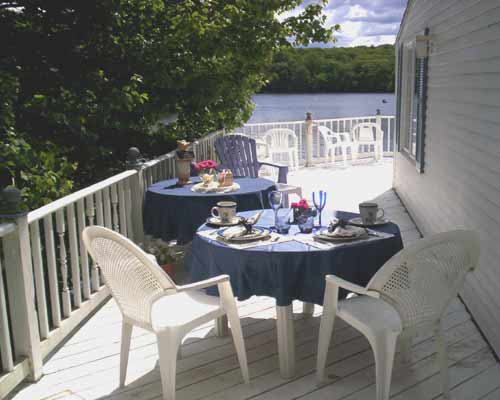 Mrs. T and I took a few hard-earned days off and went to Blueberry Pointe on the Lake, one of our two favorite retreats. (This is the other one.) We sat on the spacious deck of our tranquil lakeside cottage, cooked hot dogs on the grill, listened to the birds singing, smelled the balmy air, and unwound as far as it’s humanly possible to unwind. I don’t know when I’ve had a more restful vacation. Bless you, Megan McArdle, for insisting that I fly the coop for a whole week!
Mrs. T and I took a few hard-earned days off and went to Blueberry Pointe on the Lake, one of our two favorite retreats. (This is the other one.) We sat on the spacious deck of our tranquil lakeside cottage, cooked hot dogs on the grill, listened to the birds singing, smelled the balmy air, and unwound as far as it’s humanly possible to unwind. I don’t know when I’ve had a more restful vacation. Bless you, Megan McArdle, for insisting that I fly the coop for a whole week!
Instead of going to plays, we spent our evenings looking at sunsets, then going inside and watching old movies, among them Kenneth Lonergan’s You Can Count on Me and John Sayles’ Sunshine State, both of which have held up fabulously well since I wrote about them early in the decade:
A couple of years ago, I wrote about The Dreamlife of Angels, a haunting French film about two down-and-out young women that got glowing reviews and made no impression whatsoever on American moviegoers (it received not a single Oscar nomination). Kenneth Lonergan’s masterly You Can Count on Me resembles that miraculous film in its straightforwardness and lack of pretence, though it also reminded me of Tender Mercies, another rare example of an American movie that accurately conveys the look and feel of small-town life. Every foot of You Can Count on Me is real.
Lonergan’s directorial debut also has in common with The Dreamlife of Angels and Tender Mercies a novelistic richness that defies the simplifying art of the pitchman. To say that it is about Terry, an immature drifter (Mark Ruffalo), and Sammy, his stay-at-home older sister (Laura Linney), orphaned in childhood and desperately lonely as young adults, is to convey nothing of the moral complexity of Lonergan’s script, which pays the viewer the compliment of not making his mind up for him. Terry is never romanticized and Sammy is never treated with condescension: they are both treated as human beings, deeply flawed but not without virtue, seeking to make their way in a postmodern world that no longer has much to offer in the way of certainty….
John Sayles’ method can be seen at its purest in Sunshine State, the unabashedly rambling story of what happens when a group of unscrupulous real-estate developers tries to take over Delrona Beach, a shabby Florida town famous for nothing, and bulldoze it into a gorgeously landscaped beachfront community full of rich golfers. (Among the bad guys is Alan King, a superannuated stand-up comedian whom old age has miraculously transformed into one of the craftiest character actors around.) While their shady machinations are central to the complicated plot, Sunshine State is not a Chinatown-like study of moral corruption, and it doesn’t even matter all that much that the bad guys lose–sort of–in the end. Sayles’ real interest is in the citizens, past and present, of Delrona Beach, in particular Marly Temple (Edie Falco), a sun-dried motel manager who hates her unadventurous life but lacks the nerve to change it, and Desirée Stokes (Angela Bassett), who left town at fifteen, black, pregnant and unmarried, and has now come back home as an adult to try to make peace with her genteel, censorious mother (Mary Alice).
If you’re thinking that all this sounds like a cross between a soap opera and an eat-your-spinach editorial in Mother Jones, I can see why. Many of Sayles’ films sound painfully stilted–on paper. It’s only when you see them, or hear him talk about them, that you realize how essentially unideological he is. This has nothing to do with politics, at least as that term used to be construed. I’m sure he’s never voted for a Republican in his life, but as a filmmaker, he doesn’t go in for political caricature, or any other kind of caricature. (Significantly, he is one of the very few filmmakers whose black characters invariably act like real people, not secular saints.)
On Friday we drove into Providence to pay a visit to the museum of the Rhode Island School of Design, whose small but uncommonly choice permanent collection contains first-class paintings by Manet, Cézanne, Winslow Homer, George Bellows, Lyonel Feininger, and Jackson Pollock, none of which I can show you, alas, because the museum is foolishly cautious about making images available on line. Afterward we ate pizza and pasta in the garden of Al Forno, our favorite restaurant in New England.
Today we’re headed back to Connecticut, but only just long enough to change clothes. Work awaits, and our next stop is Garrison, New York, where we’ll be visiting the Hudson Valley Shakespeare Festival and the Storm King Art Center, located across the Hudson River in Mountainville.
More as it happens….
